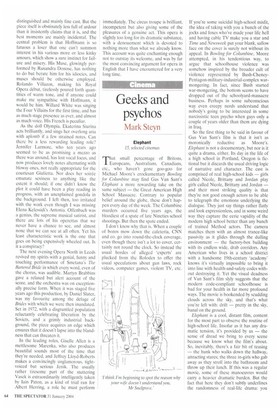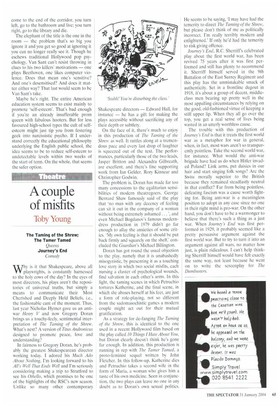Geeks and psychos
Mark Steyn
Elephant 15, selected cinemas
That small percentage of Britons, Europeans, Australians, Canadians, etc., who haven't gone goo-goo for Michael Moore's crockumentary Bowling for Columbine may find Gus Van Sant's Elephant a more rewarding take on the same subject — the Great American High School Massacre. Contrary to popular belief around the globe, these don't happen every day of the week. The Columbine murders occurred five years ago, the bloodiest of a spate of late Nineties school shootings. But then the spate ended.
I don't know why that is. When a couple of bozos mow down the cafeteria, CNN and co. go into round-the-clock coverage, even though there isn't a lot to cover, certainly not round the clock. So instead the usual hordes of alleged 'experts' are plucked from the Rolodex to offer the usual speculations about gun laws, rock videos, computer games, violent TV, etc. If you're some suicidal high-school misfit, the idea of taking with you a bunch of the jocks and foxes who've made your life hell and having cable TV make you a star and Time and Newsweek put your blank, sallow face on the cover is surely not without its appeal. In Bowling for Columbine, Moore attempted, in his tendentious way, to argue that schoolhouse violence was somehow inspired by the broader cult of violence represented by Bush-CheneyPentagon-military-industrial-complex warmongering. In fact, since Bush started war-mongering, the bottom seems to have dropped out of the schoolyard-massacre business. Perhaps in some subconscious way even creepy nerds understand that nobody's going to be interested in some narcissistic teen psycho when guys only a couple of years older than them are dying in Iraq.
So the first thing to be said in favour of Gus Van Sant's film is that it isn't as moronically reductive as Moore's. Elephant is not a documentary, but nor is it quite a drama, either. Its day in the life of a high school in Portland, Oregon is fictional but it discards the usual driving logic of narrative and character. The cast is comprised of real high-school kids — girls called Nicole, Brittany and Jordan play girls called Nicole, Brittany and Jordan — and their most striking quality is that they're not good enough actors to be able to telegraph the emotions underlying the dialogue. They just say things rather flatly and look expressionless, and in some weird way they capture the eerie vapidity of the modern high school better than any bunch of trained Method actors. The camera matches them with an almost trance-like passivity as it glides through the dulling environment — the factory-box building with its endless wide, drab corridors. Any American who lives in a school district with a handsome 19th-century 'academy' knows it's virtually impossible to bring it into line with health-and-safety codes without destroying it. Yet the visual deadness of Van Sant's film slyly suggests that the modern code-compliant schoolhouse is bad for your health in far more profound ways. The movie is bookended by scudding clouds across the sky, and that's what you're left with: drift — pretty in the sky, banal on the ground.
Elephant is a cool, distant film, content for the most part to observe the routine of high-school life. Insofar as it has any dramatic tension, it's provided by us — the sense of dread we bring to every scene because we know what the film's about. So, inevitably, there's a fair bit of teasing — the hunk who walks down the hallway, attracting stares; the three in-girls who gab away as they stroll into the bathroom and throw up their lunch. If this was a regular movie, some of these manoeuvres would carry a heavier dramatic burden. But the fact that here they don't subtly underlines the randomness of real-life drama: you come to the end of the corridor, you turn left, go to the bathroom and live; you turn right, go to the library and die.
The elephant of the title is the one in the room — the problem that's so big you ignore it and you get so good at ignoring it you can no longer really see it. Though he eschews traditional Hollywood pop psychology, Van Sant can't resist throwing in clues to his two killers' motivations — one plays Beethoven, one likes computer violence. Does that mean one's sensitive? And one's desensitised? And does it matter either way? That last would seem to be Van Sant's take.
Maybe he's right. The entire American education system seems to exist mainly to promote 'self-esteem'. That's bad enough if you're an already insufferable prom queen with fabulous hooters. But for less favoured high-school types the cult of selfesteem might just tip you from festering geek into narcissistic psycho. If I understand correctly the educational philosophy underlying the English public school, the idea seems to be to reduce self-esteem to undetectable levels within two weeks of the start of term. On the whole, that seems the safer option.





























































































 Previous page
Previous page